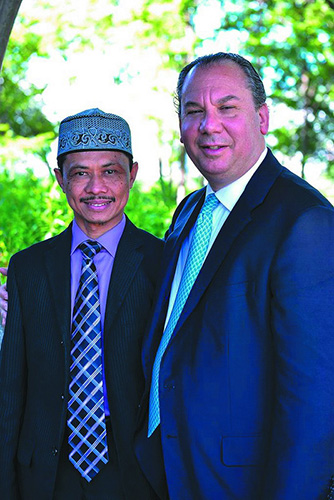


Paramus—Two unlikely partners fighting misconceptions between Jews and Muslims arrived at the Frisch School on Wednesday morning to talk about how it is possible to build bridges across a chasm. Rabbi Marc Schneier, founder of the Foundation for Ethnic Understanding, an 18th generation rabbi from a distinguished rabbinic dynasty and a mesumach of YU, openly admitted to Frisch students, “I grew up in a rabbinic home, and when I heard the word Islam or anything about Muslims, they were depicted as the enemy. I demonized an entire community without really knowing them or ever having a conversation or engagement with them.” Now, with Imam Shamsi Ali, they tackle the toughest social/political/religious issue the world has ever known—that of Jewish-Muslim relations.
The rabbi’s son, Brendan, is a student at Frisch and some of his classmates asked that his father be invited to speak at the school. Frisch invites major Jewish American leaders to speak to their student body once a month. The school’s Associate Principal, Rabbi Eli Ciner, followed through with the invite and asked Schneier to speak about his new book, Sons of Abraham, co-authored with Shamsi Ali and with a forward by President Bill Clinton. The rabbi accepted and asked if they would also be interested in having the Imam come as well. The answer was an enthusiastic yes.
Frisch is the largest Yeshiva High School in the metropolitan area and made history on Wednesday by being the first yeshiva to host an Imam. They told the students that both men were raised in environments that made them suspicious of each other, and so they began to have conversations, which resulted in the book. Their joint presentation is one they developed on their book tour to places like Austria, Italy, Israel, Germany and many cities across the U.S.
The men work to narrow the gap between the two communities that share more in common than any other formalized religion. Schneier told JLBC, “Our work is less about dialogue and more about Muslim leaders speaking out against antisemitisim and Holocaust denial. It’s about Jews and Jewish leaders speaking out against Islamophobia and anti-Muslim bigotry.”
Said the Imam: “There are certain misunderstandings about Jewish people that we learn from the Holy Koran, it’s about understanding it (the holy Koran texts) about the interpretations. For example Jewish people will not be pleased with you unless you follow them or the idea of Jews being the `Chosen Ones.” Ali patiently elaborated on what that really means to the captivated audience of high school students
“I came to this country with all these misconceptions, I had no previous conversations with Jews, but post 9/11, CBS TV invited me to an interview, and it is where Rabbi Schneier and I met. We shook hands but never really made eye contact. As I said I had suspicions, later after he established FFEU, we reconnected. Now, we consider ourselves partners for good. I am here to fight for his rights and he is here to fight for my rights.”
Imam Ali is a brilliant scholar who has memorized the Holy Koran in its entirety and has studied in Pakistan and in Saudi Arabia. The Imam, until two years ago, headed the large mosque in New York, on East 96th Street and Third Avenue. He devotes much of his time now to this project.
Schneier credits the idea of interfaith dialogue and the launch of the FFEU to his alliance with rap music and fashion mogul Russell Simmons. “When we started we were supported by the likes of LL Cool J and Jay-Z.”
Russell Simmons not present for the historic student exchange, but did speak to JLBC by phone after the event and reminisced on his partnership with Schneier and the early days of FFEU, “It started with a meeting at my house. I invited Elie Wisel, and Israel Singer along with Rabbi Schneier to meet with Cornel West, Martin Luther King III, Reverend Jackson, and Minster Farakahn and no one came except Rabbi Schneier. It was more about Black-Jewish relations at that time.”
Although no one listened initially, Simmons persisted in creating, along with Schneier, the platform for dialogue between diverse groups, “The greatest disconnect poses the greatest threat.” says Simmons. “I believe in the prophets; there is a common thread and I believe more can be achieved with conversation than with silence.”
“We have a long journey ahead but the good news is the journey has begun,” says Schneier.
By Elyse Hansford










